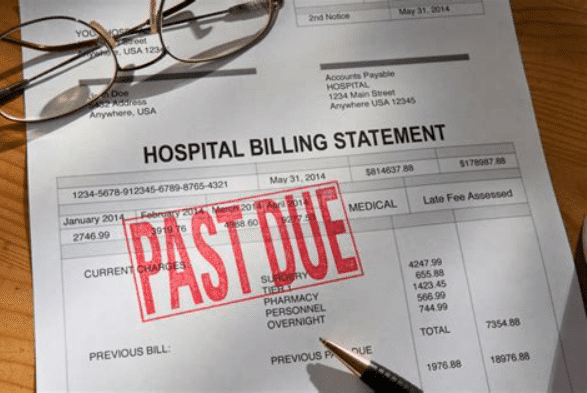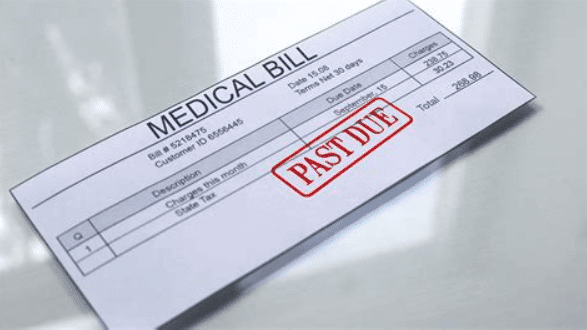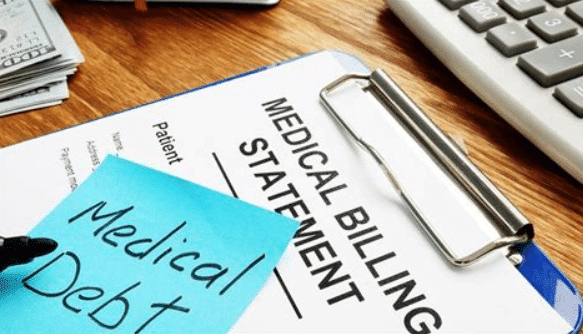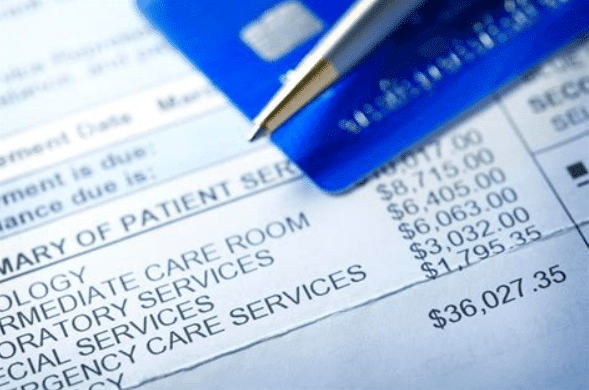Collection agencies purchase medical debts for a fraction of their original value, sometimes as little as 4% of the original medical debt amount. ZumaZip.com Learn about the debt buying process and get help with medical debt in collections
Getting a collection notice means that your creditor decided to sell your debt to a professional collection agency, and you’ll probably hear from it frequently in the coming months. Debt collectors take the collections process seriously — after all, their entire business model is collecting old debts and pursuing consumers for payment.
While you can’t stop a creditor from charging off your unpaid medical debt and selling it to a collection agency, it helps to know how the process works. In some cases, you may be able to use it to your advantage.
Settle your medical debt fast with the help of ZumaZip Settle.
How collection agencies buy medical debt
Costs for medical care in the U.S. are notoriously high. Purchasing a health plan through the Affordable Care Act’s online marketplace can set you back an average of $560 monthly, and an in-patient hospital visit can run into thousands of dollars.
People without health insurance are at high risk of incurring large medical bills, especially if they experience a catastrophe that requires surgery or extended time in a medical facility. But health insurance doesn’t cover all your medical costs. Most plans have deductibles and require co-pays for certain services. A $50,000 hospital visit can cost you $5,000 or more, even if you have a decent plan.
Hospitals aren’t allowed to turn away patients who need emergency care, even if they don’t have health insurance. Uninsured patients who need their services will receive a bill afterward and may be unable to pay it.
If you don’t pay an outstanding medical bill, your creditor will try to set up a payment arrangement with you. If time passes and you don’t attempt to repay the debt, it may charge off the obligation and sell it to a collection agency.
Typically, collection agencies purchase outstanding debts from providers and hospitals in their area. Some larger medical providers partner with specific collection agencies and regularly sell them debts.
Collection agencies buy outstanding medical debts at a fraction of their original value, especially if the chance of collecting the entire amount is remote. Debt buyers may pay as little as $0.04 to $0.14 for every dollar of a consumer’s outstanding debt. These costs vary depending on the age of the debt and the likelihood of collecting some of the money due. In other words, collection agencies may pay as little as 4% of the original medical debt amount and then try to collect on the full amount, making a huge profit if they do.
What happens after a collection agency buys your medical debt?
Once a collection agency gets hold of your outstanding medical debt, it will initiate communication with you via a written letter. The first letter from the collection agency should note the amount you owe and your original creditor. It will also give you 30 days to dispute the debt.
You should immediately ask the collection agency to validate your debt. A debt validation confirms that the collection agency is the proper new debt owner. You can also ask it to provide an age for the debt, which tells you how long you have until the statute of limitations runs out.
If you’re unsure how to draft a Debt Validation Letter, use ZumaZip.com’s Debt Validation Letter template.
If you don’t make arrangements to repay your medical debt, the collection agency may take legal action against you. A medical debt lawsuit can make a bad situation worse, especially if the collection agency wins a judgment. The judgment will allow the agency to garnish your wages or seize money from your bank account.
Let’s consider an example.
Example: Ned is out surfing one day when a shark suddenly attacks him. Fortunately, his injuries aren’t too severe, but he needs stitches for a bite to his torso. Ned goes to the local hospital, which treats him for the shark bite. He doesn’t have health insurance and receives a $4,000 bill from the hospital a few weeks later. Ned doesn’t have the money to pay the hospital bill, so he ignores it. Six months later, a collection agency purchases Ned’s account and contacts him. Ned sets up a monthly payment plan to pay off his medical bill over several years, which lets him avoid legal action from the collection agency.
Take action when a collection agency purchases your medical bill
When a collection agency purchases a medical debt you owe, you’ll likely hear from it often.
Make sure that the agency is the proper debt owner before you agree to make any payments. You may be able to set up payment arrangements or settle the debt for less than you owe. While having a medical debt in collections can be frustrating, addressing the situation head-on is better than allowing it to fester.
What is ZumaZip?
ZumaZip is a convenient solution designed to streamline your response to a debt collection lawsuit. Here’s a breakdown of what you can expect when you use ZumaZip:
Firstly, you’ll access our user-friendly web application, which guides you through the process step by step. You’ll be prompted to answer a series of questions related to your specific situation. Once you’ve completed the questionnaire, you have the option to either print out the finalized forms and mail them to the appropriate courts yourself, or you can opt to utilize ZumaZip’s services to file them on your behalf. Additionally, if you choose this option, an attorney will review your document for added peace of mind.
If you’re seeking guidance on how to effectively respond to a debt collection lawsuit, ZumaZip can provide the assistance you need. Feel free to explore our FAQs for more information on what ZumaZip has to offer.
What if I haven’t been sued yet?
If you’ve only received a collections notice, but not a lawsuit, the best way to respond is with a Debt Validation Letter. When a debt collector contacts you in any way, whether it’s by phone or mail, you can respond by formally requesting a debt validation with a Debt Validation Letter . This letter notifies the collector that you dispute the debt and forces them to provide proof you owe the debt. They can’t call you or continue collecting until they provide validation of the debt. This flowchart shows how you can use a Debt Validation Letter to win.
Get started with a Debt Validation Letter here.
How to Answer a Summons for debt collection in all 50 states
Here’s a list of guides on how to respond to a debt collection lawsuit in each state:
- Alabama
- Alaska
- Arizona
- Arkansas
- California
- Colorado
- Connecticut
- Delaware
- Florida
- Georgia
- Hawaii
- Idaho
- Illinois
- Indiana
- Iowa
- Kansas
- Kentucky
- Louisiana
- Maine
- Maryland
- Massachusetts
- Michigan
- Minnesota
- Mississippi
- Missouri
- Montana
- Nebraska
- Nevada
- New Hampshire
- New Jersey
- New Mexico
- New York
- North Carolina
- North Dakota
- Ohio
- Oklahoma
- Oregon
- Pennsylvania
- Rhode Island
- South Carolina
- South Dakota
- Tennessee
- Texas
- Utah
- Vermont; Vermont (Small Claims court)
- Virginia
- Washington
- West Virginia
- Wisconsin
- Wyoming
Guides on how to beat every debt collector
Hey there! Facing off against a debt collector can feel like a daunting challenge, but fear not! We’re here to help you navigate through it all with our handy guides designed to assist you in beating every debt collector you encounter. Whether you’re facing a new lawsuit or dealing with a persistent collector, we’ve got your back. Stay positive, stay informed, and let’s tackle this together!
- Absolute Resolutions Investments LLC
- Accredited Collection Services
- Alliance One
- Amcol Clmbia
- American Recovery Service
- Asset Acceptance LLC
- Asset Recovery Solutions
- Associated Credit Services
- Autovest LLC
- Cach LLC
- Cavalry SPV I LLC
- Cerastes LLC
- Colinfobur
- Covington Credit
- Crown Asset Management
- CTC Debt Collector
- Cypress Financial Recoveries
- Delanor Kemper & Associates
- Eagle Loan of Ohio
- Educap
- Estate Information Services
- FIA Card Services
- Forster & Garbus
- Freshview Solutions
- Fulton Friedman & Gullace LLP
- Harvest Credit Management
- Howard Lee Schiff
- Hudson & Keyse LLC
- Integras Capital Recovery LLC
- Javitch Block
- Jefferson Capital Systems LLC
- LVNV Funding
- Mannbracken
- Mariner Finance
- Medicredit
- Michael J Adams PC
- Michael J Scott
- Midland Funding LLC
- Mullooly, Jeffrey, Rooney & Flynn
- Mountain Land Collections
- MRS Associates
- National Collegiate Trust
- Nationstar Foreclosure
- Northstar Capital Acquisition
- NCEP LLC
- NRC Collection Agency
- OneMain Financial
- Palisades Collection LLC
- Pallida LLC
- Paragon Revenue Group
- Pinnacle Collections Agency
- PMAB LLC
- Portfolio Recovery Associates
- Provest Law
- PYOD LLC
- Reunion Student Loan Finance Corporation
- Revenue Group
- Regents and Associates
- RSIEH
- Salander Enterprises LLC
- Second Round Sub LLC
- Security Credit Services
- Sherman Financial Group
- Suttell and Hammer
- T-Mobile
- Transworld Systems
- Tulsa Teachers Credit Union
- UCB Collection
- Velo Law Office
- Velocity Investments
- Waypoint Resource Group
- Weinberg and Associates
- Wolpoff & Abramson
Settle your medical debt
Having a health challenge is stressful, but dealing medical debt on top of it is overwhelming. Here are some resources on how to manage medical debt.
- Am I Responsible for My Spouse’s Medical Debt?
- Do I Need a Lawyer for Medical Bills?
- Do I Need a Lawyer to Fight Medical Bill Debt?
- Does Bankruptcy Clear Medical Debt?
- How Much Do Collection Agencies Pay for Medical Debt?
- How to Find Medical Debt Forgiveness Programs
- Is There a Statute of Limitations on Medical Bills?
- Medical Debt Statute of Limitations by State
- Summoned to Court for Medical Bills — What Do I Do?
- Summoned to Court for Medical Bills? What to Do Next
Stop calls from Debt Collectors
Do you keep getting calls from an unknown number, only to realize that it’s a debt collector on the other line? If you’ve been called by any of the following numbers, chances are you have collectors coming after you, and we’ll tell you how to stop them.































